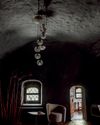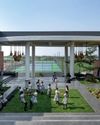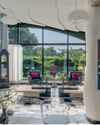Swapnil And Rahul Dalvi Recount Their Two-Decade long Design Journey At Dalvi Associates.

She was just a girl when her mother and sisters introduced her to art. Drawing, painting, writing, stitching and learning Bharatanatyam was part of young Swapnil’s daily schedule. But eventually, she was drawn to a different art – of space and form – and she left no stone unturned to adapt her interest in architecture into a career. The various festivals she attended as a classical Indian dancer led to interactions with people from different parts of the world – which, in turn, led to the understanding of different cultures, values and how architecture lives through it. “The journey through other cultures made me realise, value and respect our motherland all the more,” declares Swapnil Dalvi today.
Surprisingly, her batchmate (at MS University, Vadodara) turned-husband’s foray into architecture has been quite different from hers and that of other architects in the country. Rahul says that being in the field of architecture was “a sheer stroke of luck” and not something he dreamt of in school. “As most established achievers in my known circle were doctors or engineers, I aspired to become a mechanical engineer,” he recalls. “It was only after getting into college that I got interested in architecture. Today, I strongly believe there is no other field better than architecture... at least for me.”
It’s no wonder that he feels this way, for his and Swapnil’s combined architectural journey as the principals/partners at Dalvi Associates, has been as inspirational as it is influential. The contrast in their journeys – Rahul’s involved a change, while Swapnil’s was straightforward thanks to her art inclinations – add an interesting dynamic to their working relationship and their approach to design.
Diese Geschichte stammt aus der April 2017-Ausgabe von Architect and Interiors India .
Starten Sie Ihre 7-tägige kostenlose Testversion von Magzter GOLD, um auf Tausende kuratierte Premium-Storys sowie über 8.000 Zeitschriften und Zeitungen zuzugreifen.
Bereits Abonnent ? Anmelden
Diese Geschichte stammt aus der April 2017-Ausgabe von Architect and Interiors India .
Starten Sie Ihre 7-tägige kostenlose Testversion von Magzter GOLD, um auf Tausende kuratierte Premium-Storys sowie über 8.000 Zeitschriften und Zeitungen zuzugreifen.
Bereits Abonnent? Anmelden

REVITALISING HISTORY
The transformation of the Chambers of Khamovnaya Sloboda into a beautiful cultural project is indeed awe-inspiring.

DESIGNING FOR LEARNING
The Basil Woods International School, Hyderabad, designed by Architecture Dialogue is a beautiful example of how design can address the challenges of a site.

THE BATH WAY
New age sanitaryware is all things innovative, design forward, hygienic, and comfortable to make bathrooms functional as well as aesthetic.

BREATHING LIFE
Studio Swatp transforms a historic Alibaug wada into a vibrant holiday retreat.

KNOCKOUT KITCHENS
The kitchen continues to be the heart of modern living spaces, with trends emphasising a seamless blend of innovation, functionality, and aesthetics.

The ROYAL DEN
Harkaran Singh Boparai, Founder and Principal Architect, Harkaran Boparai Studio (HBS), takes us through his regal atelier in the heart of Delhi and the journey that led to it.

SCULPTING FLUIDITY
The architecture of The Liquescent House by Shaili Banker Architects displays a language of organic fluidity.

DESIGN DEBATE NEW IDEAS SET SAIL IN SCENIC GOA
Replete with Portuguese vibes and picturesque sites, the October Edition of the Design Debate held in Goa was an exceptionally intriguing one.

FENESTRATION FOR VILLAS
In contemporary villa architecture, the use of new-age materials in windows and fenestration is driven by the need for durability, sustainability, and sleek design.

BOLD AND ARTISTIC
Bengaluru’s Reservoire introduces a fresh narrative to the city’s social landscape, where art, nature, and architecture converge seamlessly.